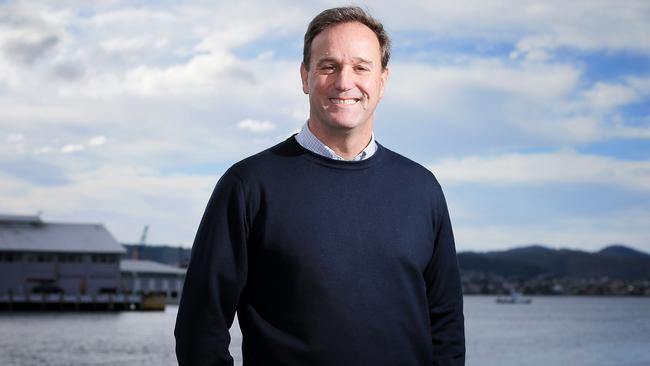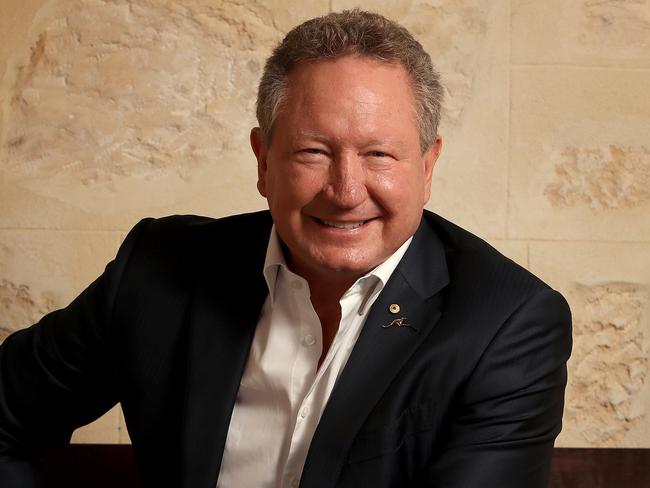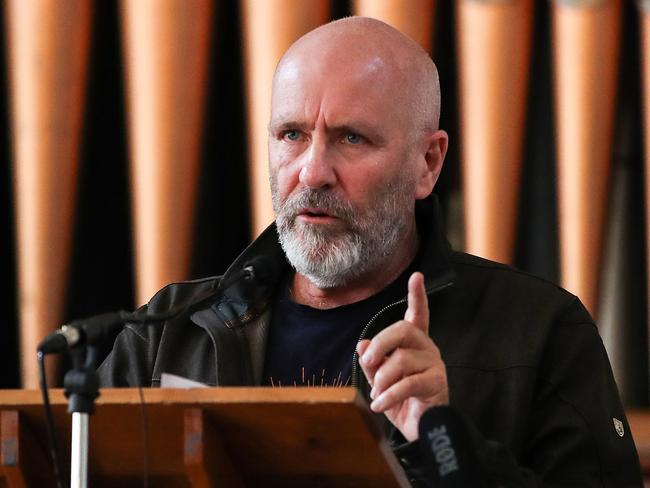Not so sustainable: WWF scales back on salmon support
A leading conservation group admits a salmon farming operation it was paid to endorse is now completely unsustainable.

WWF Australia chief executive Dermot O’Gorman has privately admitted Tasmania’s salmon industry is not environmentally sustainable, despite his charity’s previous long-running endorsement for one of the sector’s largest companies, Tassal.
The conservation group has separately and quietly released a damning review into the practice of “certifying” the sustainability credentials of Tassal and its major competitor Huon. It found the endorsements did not stop “adverse environmental outcomes”.
Tassal and Huon, which is the subject of a takeover battle between Brazilian meat processor JBS and Fortescue Minerals billionaire Andrew Forrest, have a combined market value of almost $1.2bn but have faced significant criticism about the ecological sustainability of their operations.
Salmon farming in Tasmania’s Macquarie Harbour – partly located in a World Heritage Area – has been blamed for massive fish deaths, oxygen depletion in the water and bacterial mats.
Both companies have used certification from charities like WWF Australia and the RSPCA, as well as industry body the Aquaculture Stewardship Council, to argue that their operations were ecologically sustainable and did not harm the salmon being farmed.
The WWF-commissioned report, conducted by Seafood Advisory Ltd, found the ASC’s certification had “not been set up to prevent adverse situations occurring in the first place, and the outcome-focused metrics are not flanked by requirements for mechanisms to address identified potential impacts before they become established”.

The review was commissioned in 2019, after WWF Australia ended a six-year relationship with Tassal. While the charity has not disclosed what financial benefit it received from the company, the ABC’s Four Corners in 2016 reported it received an annual payment of about $250,000. ASC, whose certification of Tassal was the basis for the WWF Australia endorsement, received a similar sum.
Richard Flanagan, the Booker Prize-winning author who most recently published an investigation into the ecological damage caused by the sector, told The Australian the WWF Australia report “strips away the last fig leaf of pretence that the salmon industry is environmentally sustainable”.
“Instead of what the salmon companies routinely claim is world’s best practice, ASC standards are found wanting, and government regulation inadequate,” he said. “A sea-based salmon farm is a floating sewage works — except the sewage is left to pour raw and untreated into our oceans.”
Despite allowing Tassal to use the charity’s name during those years, The Australian can reveal that Mr O’Gorman – who has run WWF Australia since 2010 – privately conceded the Tasmanian industry was “not sustainable”. He also said the shortcomings in the endorsement process found in the WWF Australia review were relevant “to any waterway” even beyond Macquarie Harbour.
Those admissions were made to businessman Geoff Cousins, the former Australian Conservation Foundation president. Mr Cousins, an adviser to former prime minister John Howard, confirmed Mr O’Gorman’s comments and welcomed the review’s release.
Mr Cousins said the RSPCA had significant questions to answer, with the charity still allowing Huon to use its branding on its products. The RSPCA has not disclosed whether there is a monetary benefit to the arrangement, although its most recent financial report notes the organisation raised $1.57m from its “Approved Farming” endorsement scheme. Huon denies paying for endorsements. But ecology has become a major point of contention in the proposed $550m takeover of the ASX-listed Huon by JBS.
Dr Forrest’s private company Tattarang has built a considerable stake in the salmon operation, in part because the businessman wanted to force Huon to adopt stricter environmental standards.

In August, Dr Forrest publicly attacked JBS’s animal welfare credentials, and demanded the company also improve salmon farming standards if its takeover bid for Huon was successful.
As recently as August, Huon has used the RSPCA’s endorsement to support the company’s environmental credentials.
“Huon remains the only seafood producer in Australia to achieve RSPCA Approved Farming certification and firmly believes its sustainable salmon farming practices can be benchmarked against the best standards in the world,” the company’s chairman, Neil Kearney, wrote to shareholders last month.
The RSPCA did not respond to requests for comment.
Mr O’Gorman, who did not deny his comments to Mr Cousins, said WWF Australia’s decade-long pursuit of better standards through a certification and endorsement process had failed to secure the “systemic change” the charity sought.
“Some (approaches) have led to either modest or short-term improvements, some have not – none has led to the systemic change we have been calling for over the past decade,” he said.
“WWF Australia continues to recognise independent certification schemes like ASC are important tools, often providing the initial steps to drive improvements in wild-caught fisheries and aquaculture farming.”
Mr O’Gorman stood by WWF Australia’s earlier program allowing Tassal Ltd to use its logo for ASC-certified products, saying it achieved environment gains.
“However, despite these achievements, the deficiencies … remain unaddressed, and still require urgent attention,” he said.
The WWF Australia review found ASC standards had “not been set up to ‘avoid’ or ‘prevent’ adverse situations occurring in the first place”, and good management practices were “not sufficient to protect biodiversity and ecosystem function”.
ASC Australian representative Duncan Leadbitter said the report also acknowledged the certification program’s role in improving environmental management.
“Everyone involved in aquaculture should seek to learn from what happened at Macquarie Harbour, and ASC is currently conducting a thorough review of the report and the recommendations will be incorporated into its transparent standards review process,” Mr Leadbitter said on Thursday.




To join the conversation, please log in. Don't have an account? Register
Join the conversation, you are commenting as Logout